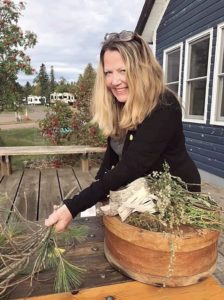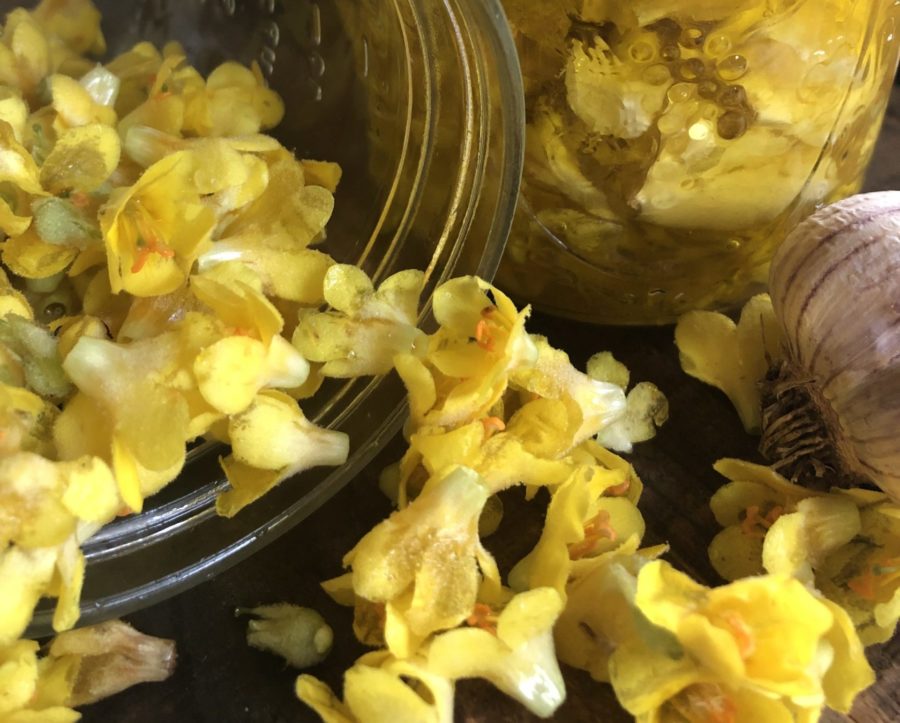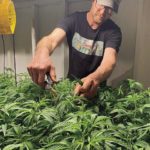Recent years have seen a surge of interest in both wellness practices and environmental awareness. In many ways, herbalism and natural medicine sit right at that intersection. Whether it’s growing an herb garden, foraging for fungi, or making your own rosehip tea, developing the ability to identify and utilize local plants can help cultivate a greater sense of self-sufficiency, wellness, and connectedness to the world around us.
Brigette Nies and Gigi Stafne are two herbalists with connections to the North Shore. Nies is a Cook County resident and the owner of Ancient Traditions Healing, while Stafne is the director of the Green Wisdom School of Natural and Botanical Medicine in Wisconsin. Stafne has taught courses in herbalism at North House Folk school in Grand Marais for over 19 years, and both she and Nies have collaborated in teaching and in clinical work.
For Stafne, her journey into herbalism began when she was starting to transition away from anti-violence work. After a bout of illness, Stafne’s mentor encouraged her to start in natural medicine. Thirty-five years later, Stafne has worked in many different realms of the natural medicine world, including opening one of the first natural medicine clinics in Wisconsin, working with Herbalists Without Borders International, and even helping to conserve disappearing plants.
“I really feel like this is a calling and I integrate all of my experiences into my teaching,” Stafne said.

According to Stafne, education is important when starting the journey into herbalism. While one’s first instinct may be to go to the internet to start researching plants, getting a local botany guide and learning from someone more experienced is a better way to start, since herbs vary region to region. It’s also good to be aware that some plants are incredibly strong and can have adverse interactions with other medications. (Those interested in herbalism should consult an experienced herbalist and/or your physician to make sure you aren’t using anything that could negatively affect your medications or preexisting health conditions.) Taking a beginner herbalism class also helps you learn more about the history and cultural aspects behind the herbs that grow in your region.
“We want people to exercise good ethics,” Stafne said. “There’s also a propensity in the U.S. to go overboard and start exaggerating all of the benefits that plants have. Natural medicine isn’t going to replace allopathic medicine but you can integrate both into your life. There are ways to develop your own natural medicine cabinet so that you can attend to small things on your own. It’s very empowering for people to grow in self-sufficiency that way.”
For those who are just beginning, culinary herbs can be a great entry point to learning more about herbalism. Starting to add nutritive plants—such as rosehips, dandelion root or mushrooms—to your diet is a simple way to start learning more about local plants while incorporating new flavors into your cooking. Understanding where your food comes from and adding more plants to your diet can help you make more conscious decisions about what you eat and how it affects you.
“You can start small by incorporating simple things into your life,” Nies said. “An example would be a mint plant—it’s a perennial and you can easily make tea with it. I find that for beginners, finding stuff that you can use in teas or weave into foods is an easy way to start. Culinary herbs are nice that way and there are lots of culinary herbs that we can grow up here.”
For the past five years, Nies has been growing a “living apothecary” on her land, with over a hundred varieties of medicinal plants that grow here in northern Minnesota. Last summer, she started a community-supported herbalism (CSH), which supplied 24 families in Cook County with herbal items such as salves, tinctures and teas that Nies formulated with plants from her land. She plans to continue the CSH this summer and possibly expand to up to 30 members.
“The CSH has given me the opportunity to spend more time out in the garden with the plants and formulating a full range of items based on what is really flourishing in the garden,” she said. “I’ve found it’s created a lovely balance for me in that I get to spend more time out in the garden, and I’ve also discovered that I love the creative process of formulating with the plants and noticing what’s thriving.”
Nies said that one of her favorite things about her journey into herbalism is the connectedness she has to the land. “I think the most magical gift in all of it for me is remembering that I am not separate from nature.”
Similarly, Stafne said that one of the most rewarding things about her journey is seeing that connectedness develop in others.
“We become better stewards of the land, we become more concerned about climate change, and we start to think more about living healthy and connected lives,” she said.
For more information on herbalism, visit greenwisdom.weebly.com and ancienttraditionshealing.com.






